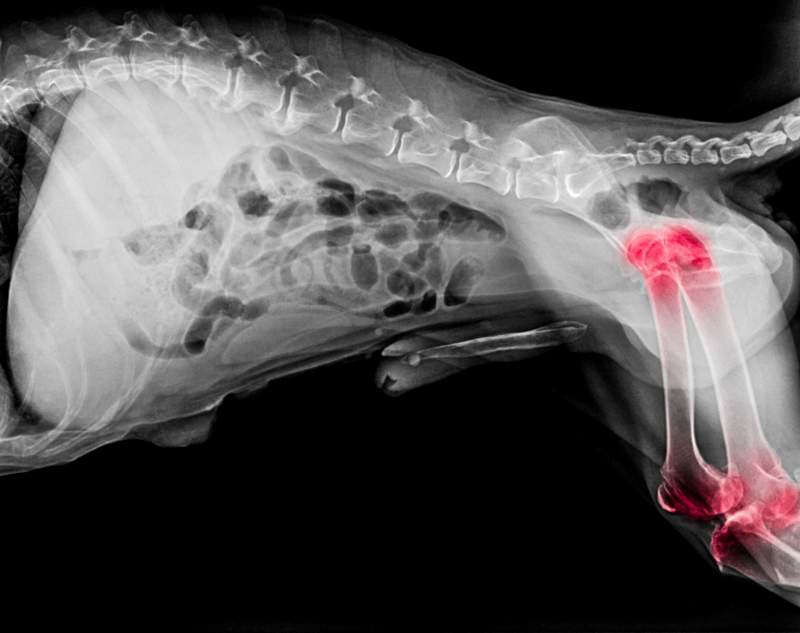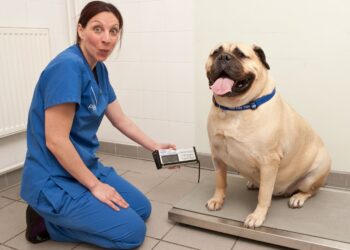Dogs are rough on their joints. From chasing squirrels to playing fetch to jumping off decks, their legs, knees and hips take a pounding and depending on the breed and age of your dog, this can become a problem. More activity means more opportunities for injuries that may sometimes lead to more serious issues such as ACL (anterior cruciate ligament) tears and osteoarthritis.
Joint issues fall into two major categories: developmental and degenerative. Developmental issues include things such as hip or elbow dysplasia, where the joint does not develop correctly for various reasons. If left untreated these diseases can lead to degenerative conditions down the line.
Dogs are most susceptible to developmental diseases in their first year of development, making it the most critical time in their life to monitor their joint health. During this phase of a dog’s life, their metabolism increases to fuel their bone and tissue development, and for large breeds especially, rapid growth can lead to growth abnormalities like angular limb deformities in long bones.
Far more common are degenerative issues that affect their ligaments and cause arthritis. These issues tend to come to light when you notice your pup is slowing down, doing less or having a harder time with activities they used to enjoy and accomplish with ease.
When you notice that your dog tires more easily and appears to have problems getting up on the couch, going upstairs or getting into the car, it’s time to help them out.
Dogs usually exhibit a slow, progressive decline when it comes to pain. Holding their limb up or holding it at a funny angle may be their first cry for help. If we fail to observe or notice these cues correctly, their issues may lead to problems if left unexamined.
Providing Supplements
Providing your dog with nutritional supplements that are both natural and highly effective is a great first step in reducing and treating joint pain. A good joint supplement will be formulated to decrease the inflammation in joints and promote joint health and cartilage development which helps keep your dog more active and youthful.
Some ingredients to look for when selecting a supplement include:
New Zealand Green Lipped Mussel (GLM): a powerful anti-inflammatory,
Glucosamine: to help reduce cartilage degradation, and
Chondroitin Sulfate: to help rebuild cartilage.
Regular Exercise
Another key component of promoting joint health is regular exercise. Keeping your pup active can help reduce stiffness while also maintaining muscle density. If pets are kept in a sedentary state for too long, their muscles can atrophy, causing instability around their joints.
Much like their human companions, if they remain inactive for too long, they are more prone to weight gain. Excessive weight gain can place an added strain on your dog’s hips, increasing their likelihood of developing dysplasia and arthritis. Simple things like going on a daily walk, playing fetch or even a playdate with one of their furry friends can go a long way in keeping their tip-top shape.
Managing Dog’s Weight
Managing a dog’s weight might seem like a challenge for owners who live a busy lifestyle, which is why the food you select is also one of the most important choices you can make for them. Selecting a quality food source with the right amount of calcium and phosphorus can do wonders for your dog’s bone and joint health.
These two minerals must be balanced in a proper ratio to avoid certain blood conditions and promote proper bone development. For this reason, it is recommended that you avoid homemade dog foods, as the micronutrient balance could be less than optimal.
If you think your pup may be in danger of developing joint issues or arthritis, it is best to begin treatment as soon as possible. Arthritis symptoms in dogs cannot be cured, but they can be relieved.
Choosing a supplement like Glyde Mobility Chews can help promote joint health in your dog and give you the satisfaction of knowing you’re giving your pup the powerful nutrients they need to promote joint health and cartilage development to keep them active and youthful for as long as possible.









